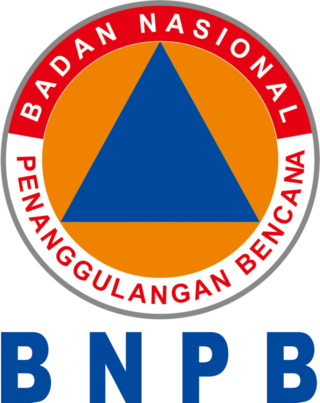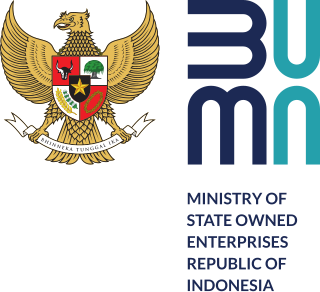Related Research Articles

The State Intelligence Agency, commonly referred to as BIN, is Indonesia's primary intelligence agency. The BIN is also responsible for coordinating intelligence activities among various intelligence agencies, including military intelligence, police intelligence, prosecutors intelligence and other relevant entities.

Indonesia's Legislation on Chinese Indonesians were conducted through a series of constitutional laws and directives enacted by the Government of Indonesia to enforce cultural assimilation of ethnic Chinese in Indonesia with the wider Indonesian society. The legislations mostly regulated individual naming conventions and business statutes.

The Agency for Language Development and Cultivation, formerly the Language and Book Development Agency and the Language Centre, is the institution responsible for standardising and regulating the Indonesian language as well as maintaining the indigenous languages of Indonesia. It is an agency under the Ministry of Education, Culture, Research and Technology of Indonesia.

The National Agency for Disaster Countermeasure, abbreviated as BNPB, is the Indonesian board for natural disaster affairs. It was established in 2008 to replace the National Coordinating Board for Disaster Management. BNPB is directly responsible to the President of Indonesia and the chairman is directly appointed by the President.
Law of Indonesia is based on a civil law system, intermixed with local customary law and Dutch law. Before the British presence and colonization began in the sixteenth century, indigenous kingdoms ruled the archipelago independently with their own custom laws, known as adat. Foreign influences from India, China and the Middle East have not only affected culture, but also the customary adat laws. The people of Aceh in Sumatra, for instance, observe their own sharia law, while ethnic groups like the Toraja in Sulawesi still follow their animistic customary law.
The Second United Indonesia Cabinet was sworn in on 22 October 2009, two days after the inauguration of President Susilo Bambang Yudhoyono for the second term. The cabinet consisted of members from Yudhoyono's Democratic Party and its coalition partners as well as non-party figures.

Ministry of State Apparatus Utilization and Bureaucratic Reform is a government ministry that is responsible for public servants in Indonesia. The ministry reports to the President of Indonesia. and is currently led by Abdullah Azwar Anas as minister.

The Ministry of State-Owned Enterprises is an Indonesian government ministry that oversee the development of state-owned enterprises in Indonesia. The ministry is led by a Minister of State Owned Enterprises, who reports to the President. The ministry is currently led by Erick Thohir.

Coordinating Ministry for Maritime and Investment Affairs was the Indonesian government ministry in charge of planning, coordinating as well as synchronizing policies in maritime affairs and investment. The coordinating minister for Maritime and Investment Affairs was Luhut Binsar Pandjaitan.

The Indonesian Maritime Security Agency is a maritime patrol and rescue agency of the Republic of Indonesia. Bakamla is a non-ministerial government institution which reports directly to the President through Coordinating Ministry for Political, Legal, and Security Affairs. Bakamla's duty is to conduct security and safety patrols in the territorial waters of Indonesia and the jurisdiction of Indonesia. Previously Bakamla was a non-structural institution called the Coordinating Agency for the Security of the Republic of Indonesia. The agency is not part or associated with the Indonesian National Armed Forces, although its top-ranking leadership are handpicked from the Indonesian Navy. Bakamla and the Indonesian Navy, however, often conduct exercises and joint-operation together. While during search-and-rescue operations, Bakamla also conduct joint-operations with the National Search and Rescue Agency.

Hansip was a type of local security officers of an administrative village in Indonesia. Based on Presidential Decree No. 55/ 1972, Hansip was part of the defense and security component in Total Defense and Security System.
In Indonesia, state-owned enterprises play an important role in the national economy. Their roles includes contributor for national economy growth, providing goods or services which are not covered by private company, employment provider, providing support guidance to small and medium businesses, and source of government revenue. The Ministry of State Owned Enterprises represents the government's function as a shareholder of most of those companies, while some are represented by the Ministry of Finance.

The Indonesian Food and Drug Authority, Badan POM/BPOM, or Indonesian FDA is a government agency of Indonesia responsible for protecting public health through the control and supervision of prescription and over-the-counter pharmaceutical drugs (medication), vaccines, biopharmaceuticals, dietary supplements, food safety, traditional medicine and cosmetics. The task and purposes of this agency is similar to the USFDA.

The Koopssus, is a special forces unit of the Indonesian National Armed Forces with counter-terrorism duties. The unit operates and was formed similarly to the United States Joint Special Operations Command (JSOC) to execute special operations missions worldwide.

The Ministry of National Development Planning/National Development Planning Agency is a ministry of the Republic of Indonesia that has the task to oversee government affairs in the field of national development planning to assist the President in organizing state government. The minister is responsible to the President. The Ministry of National Development Planning uses organizational units and resources within the National Development Planning Agency.

The Ministry of Education, Culture, Research, and Technology was a government ministry of the Indonesian government responsible for education, cultural, research, and technology affairs. Its formation resulted from the merger of the Ministry of Education and Culture and the Ministry of Research and Technology in April 2021. In October 2024, under the Red White Cabinet, the ministry was split into three ministries: Ministry of Primary and Secondary Education, Ministry of Higher Education, Science and Technology, and Ministry of Cultural Affairs.

The National Research and Innovation Agency is a cabinet-level government agency formed by the Indonesian government in 2019. Originally a new agency attached to the Ministry of Research and Technology, which became the Ministry of Research and Technology/National Research and Innovation Agency, the agency was controversially separated and established as a new non-ministerial government agency directly under the President of Indonesia on 28 April 2021. On 23 August 2021, the agency gained cabinet-level status through enactment of Presidential Decree No. 78/2021. Under the new presidential regulation, the agency became the sole national research agency of Indonesia.

National Resilience Institute is an Indonesian Non-Ministerial Government Agency tasked with carrying out government duties in the field of education for national leaders, strategic assessment of national resilience and strengthening of national values.

National Strategic Projects are Indonesian infrastructure projects which are designated as strategic in increasing economic growth, equitable development, community welfare and regional development. It was established during the administration of President Joko Widodo. PSN is regulated through a presidential regulation, while project implementation is carried out directly by the central government, regional government, and/or business entities as well as Government-Enterprise Cooperation (KPBU), prioritizing the use of domestic components. The legal basis for PSN is Presidential Regulation No. 3 of 2016 which was successively amended by Presidential Regulation No. 58 of 2017, Presidential Regulation No. 56 of 2018, and Presidential Regulation No. 109 of 2020.
Non-structural institutions or non-structural agencies are special organizations in Indonesia distinct from traditional government ministries and non-ministerial government bodies. Formed through certain legislative and executive acts, non-structural institutions are formed to support the overall functions of the state and government, addressing specific needs/tasks that cannot be as efficiently handled by existing ministries and agencies. Funding for these organizations come from the national budget (APBN).
References
- ↑ "Laporan Bulan November 2016" (PDF). Komisi Penanggulangan AIDS. Archived from the original (PDF) on 2017-07-21.
- ↑ "Lembaga Non Struktural" (in Indonesian). Kementerian Pendayagunaan Aparatur Negara dan Reformasi Birokrasi. Archived from the original on 2020-02-01. Retrieved 2019-07-30.
- ↑ "Sejarah" (in Indonesian). Komisi Penanggulangan AIDS. Archived from the original on 2018-09-07.
- 1 2 Mahendra, Gerry Katon (2018-08-29). "Kritik Penghentian Tugas Komisi Penanggulangan AIDS". GEOTIMES (in Indonesian). Retrieved 2019-07-30.
- 1 2 "Peraturan Presiden Nomor 124 Tahun 2016" (PDF) (in Indonesian). Archived from the original (PDF) on 2020-03-10. Retrieved 2019-07-30.
- ↑ "Keputusan Menteri Kesehatan Republik Indonesia Nomor 567/MENKES/SK/VIII/2006" (PDF) (in Indonesian). Archived from the original (PDF) on 2019-07-30. Retrieved 2019-07-30.
- ↑ "Prevention and control of acquired immunodeficiency syndrome (AIDS)". undocs.org. 1987-10-26. Retrieved 2019-07-30.
- 1 2 Sakti, Rangga Eka (2019-07-23). "Jejak Penanganan AIDS di Indonesia" . Kompas (in Indonesian). Archived from the original on 2019-07-30. Retrieved 2019-07-30.
- ↑ "Keputusan Presiden Nomor 36 Tahun 1994" (PDF) (in Indonesian). Archived from the original (PDF) on 2019-07-30. Retrieved 2019-07-30.
- 1 2 "Peraturan Presiden Nomor 75 Tahun 2006" (PDF) (in Indonesian). Archived from the original (PDF) on 2020-03-10. Retrieved 2019-07-30.
- ↑ "Pertemuan Koordinasi dan Penyusunan Panduan Program Lolipop" (in Indonesian). Komisi Penanggulangan AIDS. Archived from the original on 2016-12-24.
- ↑ "Penelitian Operasional" (in Indonesian). Komisi Penanggulangan AIDS. Archived from the original on 2018-08-29.
- ↑ "Laporan Bulanan" (in Indonesian). Komisi Penanggulangan AIDS. Archived from the original on 2018-09-07.
- ↑ The Lancet Hiv (2018). "Editorial: Dark clouds over Indonesia" (PDF). The Lancet HIV. 5 (8): e405. doi: 10.1016/S2352-3018(18)30181-4 . PMID 30102154.
